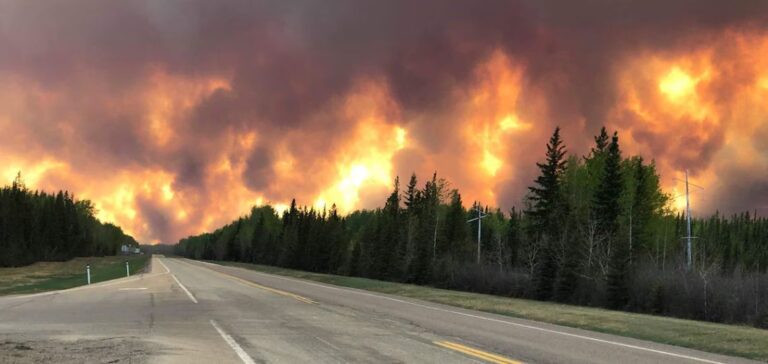Forest fires in Alberta are posing an increasingly serious threat to oil production in Canada.
According to Goldman Sachs, although oil production is currently stable, the situation could change rapidly as a result of the uncontrollable wildfires sweeping the province.
. At present, around a third of Alberta’s fires are burning out of control, jeopardizing nearly 0.4 million barrels per day of oil sands production. The recent fires have prompted oil producers to take preventive measures. Suncor Energy Inc, one of the sector’s leading players, reduced production at its Firebag field, one of Canada’s largest in situ oil sands processing facilities. This reduction in production was in place for over two weeks. In addition, other producers evacuated non-essential workers from their most affected sites to minimize risk.
Emergency measures and evacuations
In response to the situation, Canadian authorities have ordered the evacuation of the town of Jasper and Jasper National Park in Alberta.
These evacuations reflect the seriousness of the threat posed by the fires.
The safety of local populations and workers is a priority, but these measures also have an impact on the operations of oil companies in the region.
Despite these challenges, overall production remains stable for the time being.
Goldman Sachs notes that the fires have not yet caused severe disruption to production.
The bank’s note indicates that production forecasts for July remain in line with expectations, with no major disruptions recorded so far.
Oil Market Outlook
On the oil market front, geopolitical tensions, notably between Israel and Yemen, and Joe Biden’s exit from the US presidential race, have not had a significant impact on oil prices.
Goldman Sachs reports that the geopolitical risk does not alter Brent price forecasts, which remain at USD 85 per barrel for July.
Brent and West Texas Intermediate (WTI) futures are down slightly, partly due to expectations of a ceasefire in the Gaza conflict, but remain close to their forecast levels.
Analysts predict that oil prices could remain relatively stable if the geopolitical situation is resolved without major escalation.
However, the fires in Alberta could introduce further uncertainty in the months ahead if the situation does not stabilize quickly.
Future impact on the sector
In the short term, the impact of the fires on Canadian oil production appears limited, but forecasts remain subject to rapid change.
The situation remains fluid, with the potential for conditions to worsen if the fires are not brought under control.
Companies and industry analysts are closely monitoring developments to adjust their forecasts and strategies accordingly.
The Canadian oil industry could face additional challenges if the fires continue to spread, or if new production areas are affected.
The ability to maintain production while ensuring safe operations will be crucial in the months ahead.
Oil production in Canada faces an increased threat from the forest fires in Alberta.
While producers are implementing measures to limit the impact, production stability could be jeopardized if the situation evolves unfavorably.
The global oil market, however, remains relatively stable despite geopolitical tensions, although adjustments may be necessary depending on future developments.






















